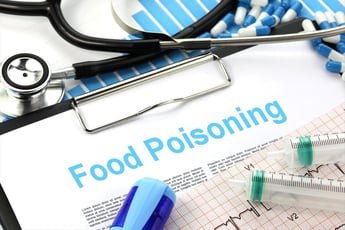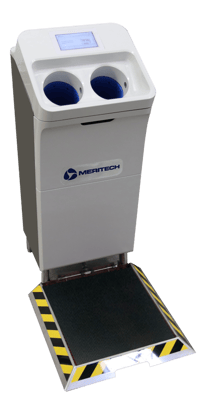The Importance of Food Safety Monitoring
Food is a fundamental aspect of our daily lives that satisfies our hunger, provides joy, and sustains us. Therefore, the safety of what we consume is of utmost importance. Ensuring that our food is free from harmful pathogens and contaminants is crucial in preserving public health and well-being. This is where food safety monitoring becomes indispensable. By implementing rigorous monitoring procedures throughout the food production and distribution process, we can detect and alleviate potential hazards, securing our health and protecting against the risk of foodborne diseases.
Food Safety Monitoring to Prevent Foodborne Illnesses
 Foodborne illnesses are a significant public health concern, and the numbers are staggering. Every year, millions of people worldwide fall ill due to consuming contaminated food, leading to severe health complications, hospitalizations, and even fatalities. The World Health Organization (WHO) estimates that the number of people affected is around 600 million, resulting in 420,000 deaths annually. These numbers are alarming and highlight the need for robust food safety monitoring practices.
Foodborne illnesses are a significant public health concern, and the numbers are staggering. Every year, millions of people worldwide fall ill due to consuming contaminated food, leading to severe health complications, hospitalizations, and even fatalities. The World Health Organization (WHO) estimates that the number of people affected is around 600 million, resulting in 420,000 deaths annually. These numbers are alarming and highlight the need for robust food safety monitoring practices.
Fortunately, food safety monitoring practices enable the early detection and prevention of foodborne illnesses. By systematically analyzing food samples at various stages, from production to consumption, authorities and food producers can identify potential hazards such as bacterial pathogens, viruses, parasites, toxins, or chemical contaminants. This information helps to protect consumers by pinpointing contamination sources, identifying trends, and taking prompt corrective actions.
Download our Food Safety and Sanitation Checklist
Food Safety Monitoring to Ensure Regulatory Compliance
To ensure the safety and integrity of our food supply chain, it is crucial to establish and maintain strict compliance with established safety standards and guidelines. Governments and regulatory bodies worldwide, including the FDA and EFSA, have implemented stringent regulations to achieve this goal. These regulations aim to identify non-compliant areas and take prompt corrective measures to ensure compliance with safety standards.
Ongoing monitoring practices, such as regular inspections, audits, and sampling programs, help to achieve this goal. Such monitoring practices enable authorities and food producers to identify and mitigate potential hazards promptly, preventing foodborne illnesses and safeguarding public health. By adhering to safety standards, companies can maintain the trust of their customers and protect the integrity of their brand. Ultimately, the success of food safety monitoring practices is dependent on the commitment of all stakeholders involved in the food supply chain, from production to consumption, to prioritize public health and safety.
Learn more about Food Safety Audits
 Implementing CleanTech® Automated Handwashing Stations can also ensure hygiene compliance and helps to simplify monitoring for regulatory compliance.By implementing these automated handwashing stations in food production and processing facilities, companies can achieve and maintain strict hygiene standards required by regulatory bodies, including the FDA. The 100% touchless and automated hand washing process ensures that all employees follow the same hygiene protocol, reducing the risk of cross-contamination and potential outbreaks. Furthermore, the CleanTech® Automated Handwashing Systems maintains a record of employee hygiene compliance, simplifying the monitoring and reporting process for regulatory compliance.
Implementing CleanTech® Automated Handwashing Stations can also ensure hygiene compliance and helps to simplify monitoring for regulatory compliance.By implementing these automated handwashing stations in food production and processing facilities, companies can achieve and maintain strict hygiene standards required by regulatory bodies, including the FDA. The 100% touchless and automated hand washing process ensures that all employees follow the same hygiene protocol, reducing the risk of cross-contamination and potential outbreaks. Furthermore, the CleanTech® Automated Handwashing Systems maintains a record of employee hygiene compliance, simplifying the monitoring and reporting process for regulatory compliance.
Learn how CleanTech® Helps Compliance
Food Safety Monitoring to Maintain Consumer Confidence and Trust
In today's world, where consumers are more informed and conscious about the food they consume, food safety monitoring has become a crucial aspect of the food industry. Companies that prioritize food safety monitoring and implement robust systems demonstrate their commitment to ensuring consumer safety, reinforcing trust, and protecting their reputation.
The importance of food safety monitoring goes beyond just building consumer confidence and trust. It also helps companies to identify potential risks and take appropriate preventive measures. Early detection and prevention of foodborne illnesses not only protect public health but also limit economic losses for the food industry. By prioritizing food safety monitoring, companies can avoid costly recalls, lawsuits, and reputational damage, which can have a significant impact on their bottom line.
Download our Personal Hygiene Policy Social Contract
Food Safety Monitoring for Early Warning Systems
 Food safety monitoring is not only crucial for detecting and preventing foodborne illnesses, but it also plays a significant role in establishing early warning systems for potential outbreaks and contamination incidents. By continuously monitoring data from various sources, including laboratory testing results, disease surveillance systems, and consumer complaints, authorities can detect patterns and identify emerging risks.
Food safety monitoring is not only crucial for detecting and preventing foodborne illnesses, but it also plays a significant role in establishing early warning systems for potential outbreaks and contamination incidents. By continuously monitoring data from various sources, including laboratory testing results, disease surveillance systems, and consumer complaints, authorities can detect patterns and identify emerging risks.
The early warning system established through food safety monitoring enables proactive measures to be taken to mitigate risks and prevent the spread of foodborne illnesses. Timely recalls, public health alerts, and targeted interventions can be implemented, limiting the impact on public health and reducing economic losses for the food industry.
Robust food safety monitoring practices are critical in ensuring the safety and integrity of our food supply chain. By identifying potential risks and taking appropriate preventive measures, governments, regulatory bodies, and food producers can prevent foodborne illnesses, maintain regulatory compliance, build consumer trust, and establish early warning systems. Therefore, the importance of implementing effective monitoring procedures cannot be overstated.
Download our Food Safety Toolbox for more resources!






